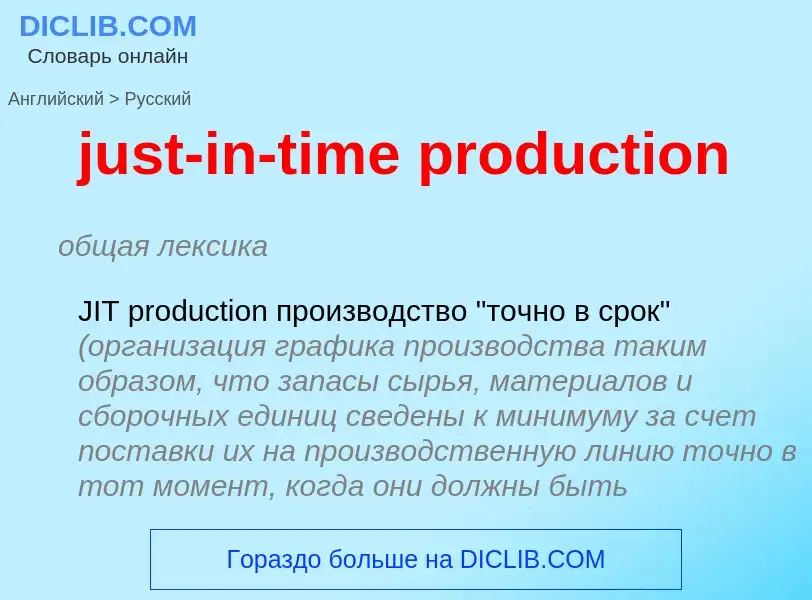Tradução e análise de palavras por inteligência artificial ChatGPT
Nesta página você pode obter uma análise detalhada de uma palavra ou frase, produzida usando a melhor tecnologia de inteligência artificial até o momento:
- como a palavra é usada
- frequência de uso
- é usado com mais frequência na fala oral ou escrita
- opções de tradução de palavras
- exemplos de uso (várias frases com tradução)
- etimologia
just-in-time production - tradução para Inglês
общая лексика
JIT production производство "точно в срок" (организация графика производства таким образом, что запасы сырья, материалов и сборочных единиц сведены к минимуму за счет поставки их на производственную линию точно в тот момент, когда они должны быть использованы; запасы конечной продукции также сведены к минимуму за счет завершения производства как раз в тот момент, когда продукцию можно реализовать)
синоним
Смотрите также
2) промышленный коэффициент полезного действия
Смотрите также
Definição
Wikipédia

Lean manufacturing is a production method aimed primarily at reducing times within the production system as well as response times from suppliers and to customers. It is closely related to another concept called just-in-time manufacturing (JIT manufacturing in short). Just-in-time manufacturing tries to match production to demand by only supplying goods which have been ordered and focuses on efficiency, productivity (with a commitment to continuous improvement) and reduction of "wastes" for the producer and supplier of goods. Lean manufacturing adopts the just-in-time approach and additionally focuses on reducing cycle, flow and throughput times by further eliminating activities which do not add any value for the customer. Lean manufacturing also involves people who work outside of the manufacturing process, such as in marketing and customer service.
Lean manufacturing is particularly related to the operational model implemented in the post-war 1950s and 1960s by the Japanese automobile company Toyota called "The Toyota Way" or the Toyota Production System (TPS). Toyota's system was erected on the two pillars of just-in-time inventory management and automated quality control. The seven "wastes" (muda in Japanese), first formulated by Toyota engineer Shigeo Shingo, are the waste of superfluous inventory of raw material and finished goods, the waste of overproduction (producing more than what is needed now), the waste of over-processing (processing or making parts beyond the standard expected by customer), the waste of transportation (unnecessary movement of people and goods inside the system), the waste of excess motion (mechanizing or automating before improving the method), the waste of waiting (inactive working periods due to job queues), and the waste of making defective products (reworking to fix avoidable defects in products and processes).
The term Lean was coined in 1988 by American businessman John Krafcik in his article "Triumph of the Lean Production System", and defined in 1996 by American researchers James Womack and Daniel Jones to consist of five key principles: "Precisely specify value by specific product, identify the value stream for each product, make value flow without interruptions, let customer pull value from the producer, and pursue perfection."
Companies employ the strategy to increase efficiency. By receiving goods only as they need them for the production process, it reduces inventory costs and wastage, and increases productivity and profit. The downside is that it requires producers to forecast demand accurately as the benefits can be nullified by minor delays in the supply chain. It may also impact negatively on workers due to added stress and inflexible conditions. A successful operation depends on a company having regular outputs, high-quality processes, and reliable suppliers.


